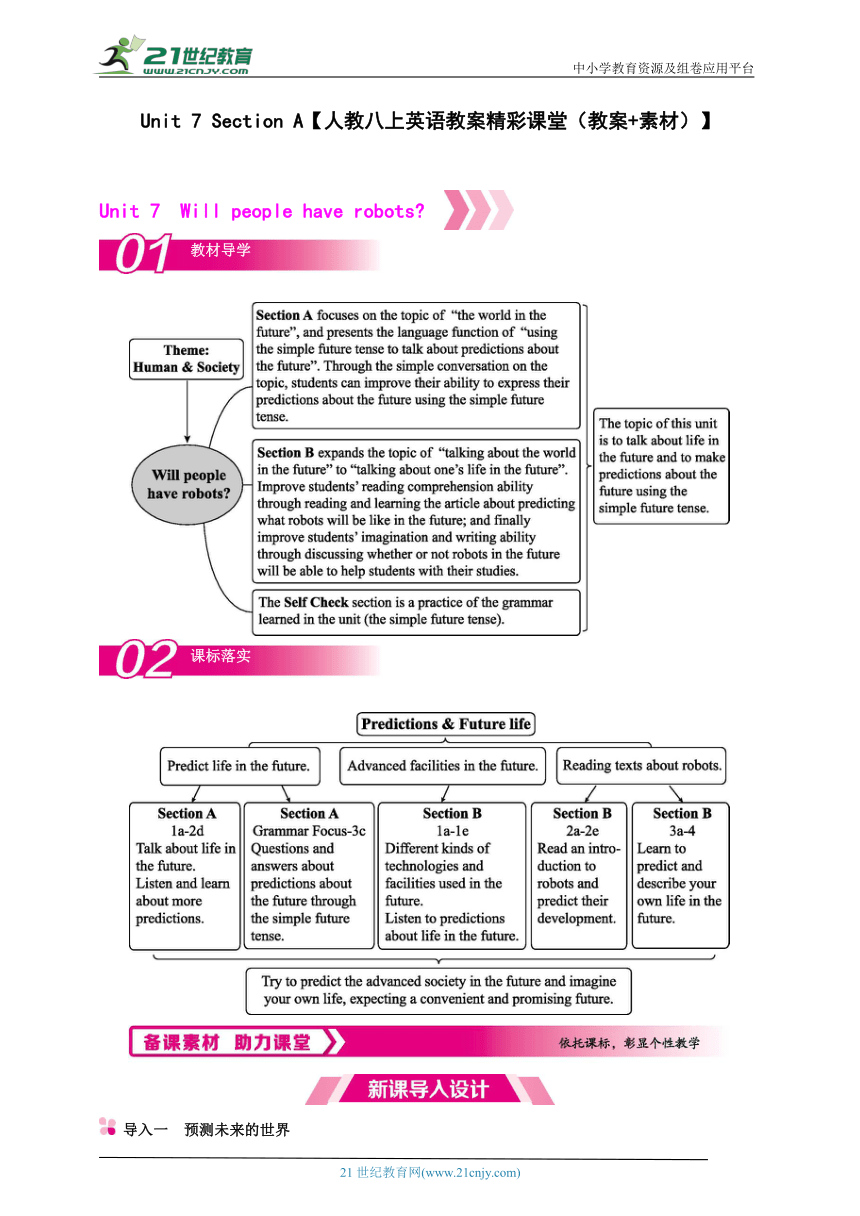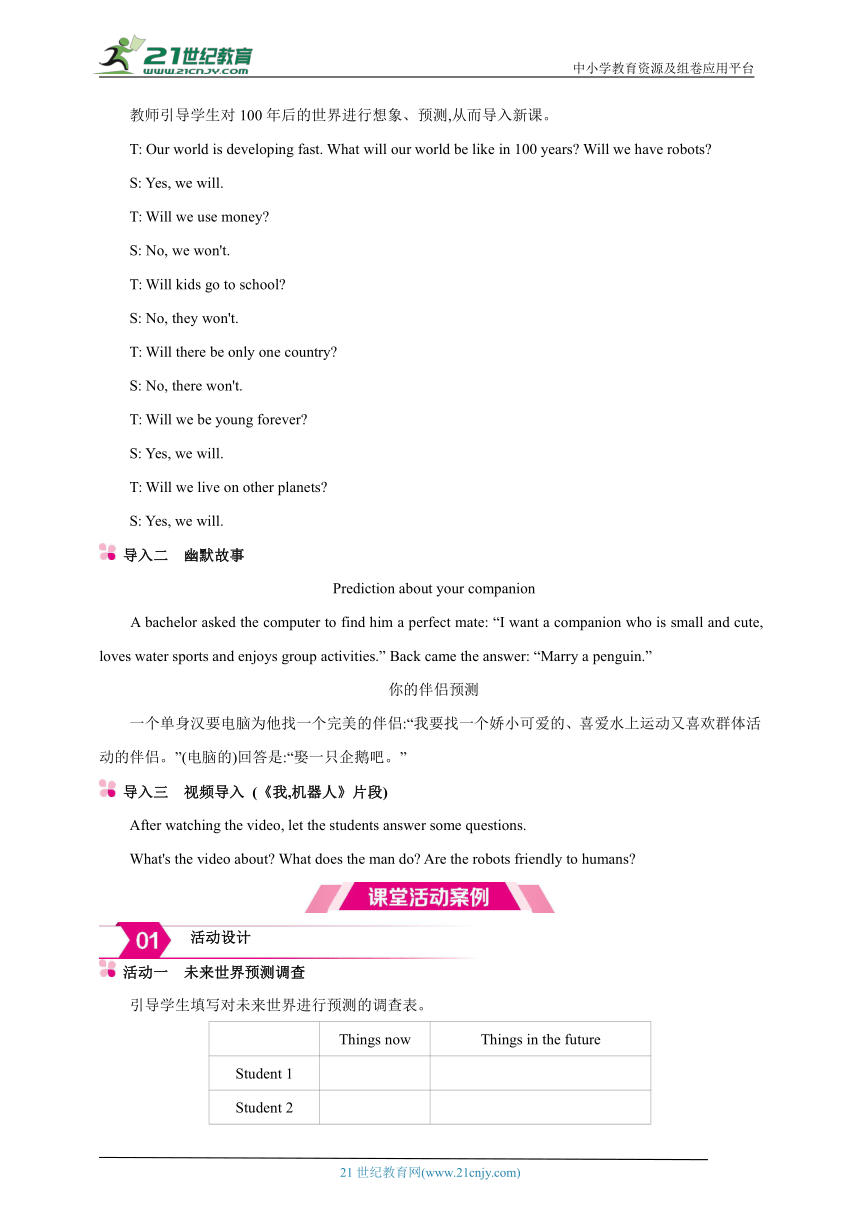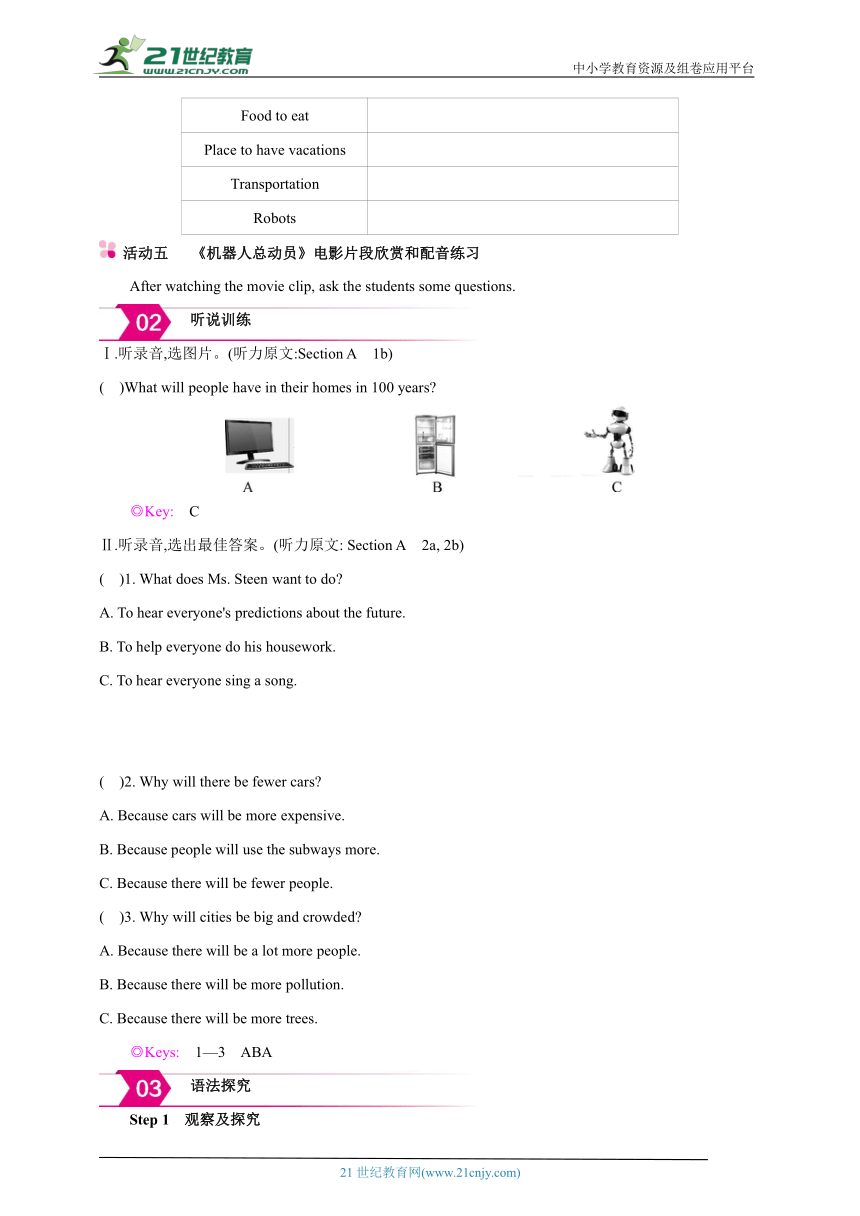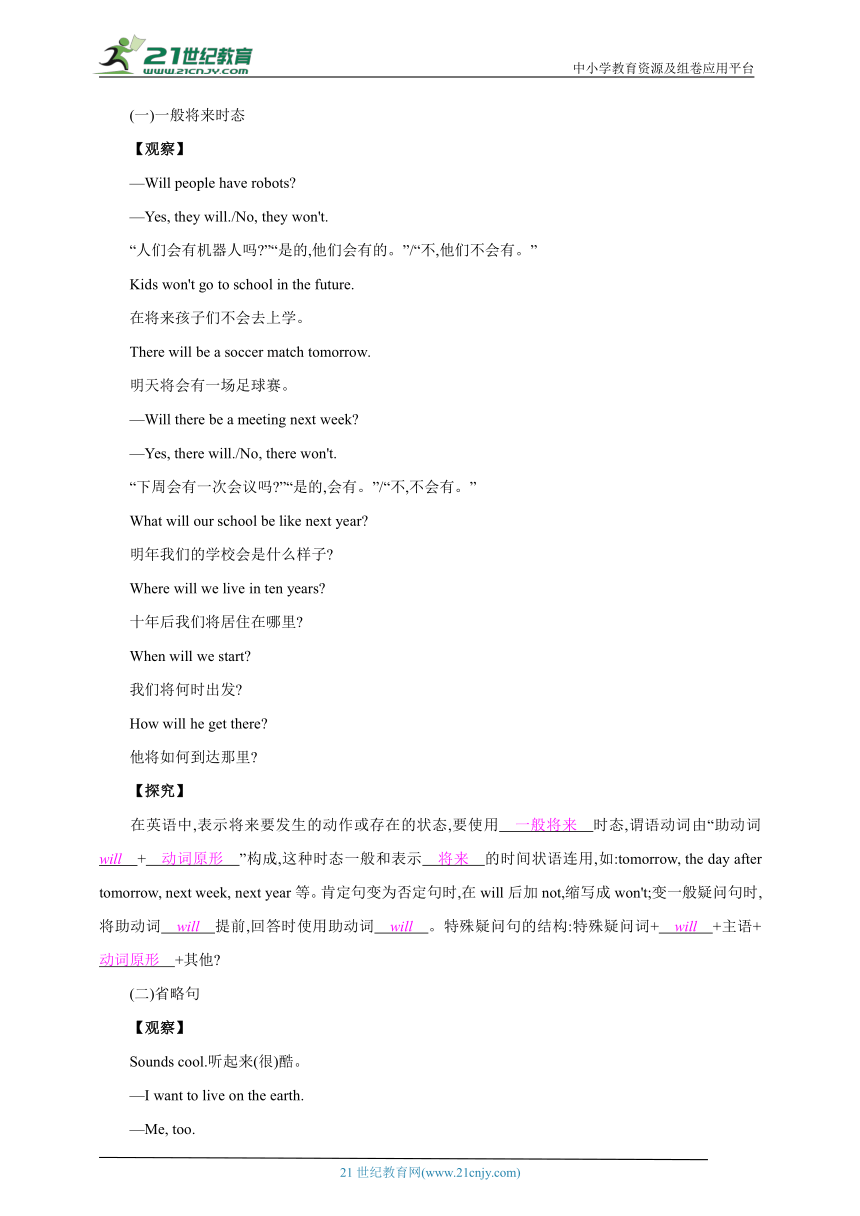Unit 7 Will people have robots? Section A【人教八上英语教案精彩课堂(教案+素材)】
文档属性
| 名称 | Unit 7 Will people have robots? Section A【人教八上英语教案精彩课堂(教案+素材)】 |

|
|
| 格式 | docx | ||
| 文件大小 | 863.7KB | ||
| 资源类型 | 试卷 | ||
| 版本资源 | 人教新目标(Go for it)版 | ||
| 科目 | 英语 | ||
| 更新时间 | 2024-09-02 00:00:00 | ||
图片预览





文档简介
中小学教育资源及组卷应用平台
Unit 7 Section A【人教八上英语教案精彩课堂(教案+素材)】
Unit 7 Will people have robots
教材导学
课标落实
导入一 预测未来的世界
教师引导学生对100年后的世界进行想象、预测,从而导入新课。
T: Our world is developing fast. What will our world be like in 100 years Will we have robots
S: Yes, we will.
T: Will we use money
S: No, we won't.
T: Will kids go to school
S: No, they won't.
T: Will there be only one country
S: No, there won't.
T: Will we be young forever
S: Yes, we will.
T: Will we live on other planets
S: Yes, we will.
导入二 幽默故事
Prediction about your companion
A bachelor asked the computer to find him a perfect mate: “I want a companion who is small and cute, loves water sports and enjoys group activities.” Back came the answer: “Marry a penguin.”
你的伴侣预测
一个单身汉要电脑为他找一个完美的伴侣:“我要找一个娇小可爱的、喜爱水上运动又喜欢群体活动的伴侣。”(电脑的)回答是:“娶一只企鹅吧。”
导入三 视频导入 (《我,机器人》片段)
After watching the video, let the students answer some questions.
What's the video about What does the man do Are the robots friendly to humans
活动设计
活动一 未来世界预测调查
引导学生填写对未来世界进行预测的调查表。
Things now Things in the future
Student 1
Student 2
Student 3
Student 4
…
活动二 Group work (与班上的同学进行对话,询问他们对未来世界的预测。)
T: What do you think our world will be like
S1: I think we will have…
T: What about you
S2: I think there will be…
T: What's your idea
S3: I think we will have…
T: What's your opinion
S4: I think we can…
活动三 Role-play (小组内的同学分角色表演,谈论我们的城市或家乡未来的样子。)
A: Today let's talk about our city in the future.
B: I think our city will be…
C: Sounds cool.
D: I think we will live in…
A: What do you think our city will be like
B: I think we will have…
C: Sounds bad.
D: …
活动四 我的未来生活情况
发挥自己的想象力,设想自己未来生活的细节。
Items Details about life in the future
Kind of job
Place to live in
Who to work with
Pets
Free time activities
Clothes to wear
Food to eat
Place to have vacations
Transportation
Robots
活动五 《机器人总动员》电影片段欣赏和配音练习
After watching the movie clip, ask the students some questions.
听说训练
Ⅰ.听录音,选图片。(听力原文:Section A 1b)
( )What will people have in their homes in 100 years
◎Key: C
Ⅱ.听录音,选出最佳答案。(听力原文: Section A 2a, 2b)
( )1. What does Ms. Steen want to do
A. To hear everyone's predictions about the future.
B. To help everyone do his housework.
C. To hear everyone sing a song.
( )2. Why will there be fewer cars
A. Because cars will be more expensive.
B. Because people will use the subways more.
C. Because there will be fewer people.
( )3. Why will cities be big and crowded
A. Because there will be a lot more people.
B. Because there will be more pollution.
C. Because there will be more trees.
◎Keys: 1—3 ABA
语法探究
Step 1 观察及探究
(一)一般将来时态
【观察】
—Will people have robots
—Yes, they will./No, they won't.
“人们会有机器人吗 ”“是的,他们会有的。”/“不,他们不会有。”
Kids won't go to school in the future.
在将来孩子们不会去上学。
There will be a soccer match tomorrow.
明天将会有一场足球赛。
—Will there be a meeting next week
—Yes, there will./No, there won't.
“下周会有一次会议吗 ”“是的,会有。”/“不,不会有。”
What will our school be like next year
明年我们的学校会是什么样子
Where will we live in ten years
十年后我们将居住在哪里
When will we start
我们将何时出发
How will he get there
他将如何到达那里
【探究】
在英语中,表示将来要发生的动作或存在的状态,要使用 一般将来 时态,谓语动词由“助动词 will + 动词原形 ”构成,这种时态一般和表示 将来 的时间状语连用,如:tomorrow, the day after tomorrow, next week, next year等。肯定句变为否定句时,在will后加not,缩写成won't;变一般疑问句时,将助动词 will 提前,回答时使用助动词 will 。特殊疑问句的结构:特殊疑问词+ will +主语+ 动词原形 +其他
(二)省略句
【观察】
Sounds cool.听起来(很)酷。
—I want to live on the earth.
—Me, too.
“我想居住在地球上。”“我也是。”
I'll take a holiday in Beijing when possible.
可能的话,我会在北京度假。
【探究】
在英语中,为了避免重复,常常省略句子的一个或几个成分,这样的句子叫 省略句 。
在对话中,谈论双方都知道的对象时,可以省略句子的主语。如:“Sounds cool.” 前面省略了主语 that ; “when possible”的完整结构是“when (it is) possible”。
在“—I am going to school. —Me, too.”中,“Me,too.”的完整结构是“I'm going to school, too.”
语法巧记口诀:
一般将来时态
表将来怎么办,将来时态来实现,
will动原紧相连,句子结构特简单。
变否定如何办,写成won't不太难,
一般疑问怎么办,will放在句子前,
特殊疑问不太难,句子结构记心间,
特词will主语前,后面动原还相连。
Step 2 练习巩固 (教材P51 3b)
Section A
第一课时(1a-2d)
Study of the Text
What: 1a and 1b are to present different kinds of changes in the future for students to broaden their minds and imagination. 1c is to develop students' ability to communicate and express themselves. 2a and 2b are to enlarge students' vocabulary to describe the changes in life. 2c and 2d are to help students to consolidate vocabulary and practice what they learned.
Why: Students try to predict how the world will be different in the future and learn about possible changes due to rapid development, including both good and bad aspects so that students can develop their critical thinking.
How: Presentation of predictions about the future is useful to activate students' inspiration and imagination of the future. Listening tasks are arranged for students to develop critical thinking and broaden their minds of life in the future.
Teaching Objectives
1.To learn to make predictions with the words learned in this unit.
2.To learn to predict the future with the sentence patterns: will do, there will be.
3.To learn to express quantities with “more” “less” and “fewer”.
4.Role-play the conversation.
Teaching Process
Teaching Objectives Teaching Activities Effectiveness Evaluation
1.To learn to make predic-tions with the words learned in this unit. 2.To learn to predict the future with the sentence patterns: will do, there will be. Step 1 Lead-in 1.Free talk: What do you want to be when you grow up Do you think your ideal job would be replaced by robots Why or why not 2.Discussion: Will people have robots in their homes in 100 years 3.Presentation: Look at pictures shown on slides and make sentences using the simple future tense to predict life in the future. Step 2 Work on 1a 1.Read statements in 1a and choose your opinion on them. 2.Work in groups. Are these changes good or bad for our life Describe your ideal life in the future for your partner. Step 3 Work on 1b&1c 1.Listen and circle the predictions you hear in 1a. 2.Ask and answer questions about the predictions in 1a. 3.Give your own prediction about the future and talk with your partner. Praise students' expressions and active discussion. Observe whether most students can use“will” or “won't” to predict future life. Listen to students' opinions and participate in their discussion. Encourage students to broaden the sphere of their predictions and include more aspects of future life.
Purpose To activate students' background information and develop their critical thinking.
3.To learn to express quantities with “more” “less” and “fewer”. Step 4 Listening Work on 2a: 1.Read the sentences in 2a. 2.Play the recording for the students to listen to and let them circle the words they hear. 3.Play the recording again to check the answers. Work on 2b: 1.Read the sentences and explain some main points to the students. 2.Play the recording for the students to check the predictions they hear. 3.Play the recording again to check the answers. Work on 2c: Make conversations about the predictions in 2a and 2b. Observe whether students can get key information the first time they listening. Give some listening tips to students to get information and locate the answer.
Purpose To enlarge students' vocabulary to predict changes in the future. To develop students' ability to listen and communicate. To improve students' language-using ability.
4.Role-play the conver-sation. Step 5 Role-play the conversation (2d) 1.Talk about the predictions with the pictures in 2d. 2.Role-play the conversation in 2d. Participate in students' conversation and praise their expressions learned before.
Purpose To develop students' ability to communicate and practice what they learned in real life. To activate students' predictions about life from different aspects.
Homework: 1.Required: Review the new words and try to remember them. 2.Optional: Make a conversation about the future you like and write it down.
Teaching Reflection
第二课时(Grammar Focus-3c)
Study of the Text
What: This grammar lesson is about the simple future tense and comparatives. Dialogues about future predictions present the use of “will” or “won't” and comparatives including “fewer” “less” “more” to modify uncountable and countable nouns.
Why: Grammar Focus is to present the use of the simple future tense and the three comparative words. 3a is to help students to distinguish differences among “fewer” “less” and “more”. 3b is to broaden students' sphere of predictions and to develop their writing ability. 3c is to activate students' study interest and imagination of the future.
How: Questions and answers are used to present sentences and expressions using “will” “fewer” “less” and “more”. After tips for differences among “fewer” “less” and “more”, filling in blanks in sentences is useful for students to consolidate knowledge. Lastly, students can practice grammar by making sentences and describing pictures.
Teaching Objectives
1.To learn to use “will+do”.
2.To learn to use “there will be”.
3.To be able to predict a city in the future with the words: more, fewer, less.
Teaching Process
Teaching Objectives Teaching Activities Effectiveness Evaluation
1.To learn to use “will+do”. 2.To learn to use “there will be”. Step 1 Warming-up Free Talk: What will your life be like in ten years What will your life be like in twenty years What will life be like in 200 years Step 2 Presentation and Practice 1.Present sentences with blanks to activate students' background information. 2.Check answers with the class and correct mistakes. 3.Explain key points of grammar. 4.Work on 3a. Fill in the blanks with more, less or fewer. 5.Discussion: What has changed from before Use more, less or fewer to share your opinions with your partner. Encourage students to describe and predict the future with correct grammar. Praise their hard work on grammar and correct wrong expressions.
Purpose To improve students' ability to use language and enlarge students' vocabulary to describe changes.
3.To be able to predict a city in the future with the words: more, fewer, less. Step 3 Group work Work on 3b&3c: 1.Complete the sentences in 3b. 2.Work in groups. Draw a picture of your future prediction according to your sentences in 3b. 3.Invite some groups to show the picture and introduce it to the class. Grasp how well students master the content and language based on their predictions.
Purpose To improve students' practicing ability and overall development. To activate students' interest in the class and develop their ability to cooperate and describe.
Homework: Write a short passage to describe how your best friend will be different in five years.
Teaching Reflection
21世纪教育网 www.21cnjy.com 精品试卷·第 2 页 (共 2 页)
21世纪教育网(www.21cnjy.com)
Unit 7 Section A【人教八上英语教案精彩课堂(教案+素材)】
Unit 7 Will people have robots
教材导学
课标落实
导入一 预测未来的世界
教师引导学生对100年后的世界进行想象、预测,从而导入新课。
T: Our world is developing fast. What will our world be like in 100 years Will we have robots
S: Yes, we will.
T: Will we use money
S: No, we won't.
T: Will kids go to school
S: No, they won't.
T: Will there be only one country
S: No, there won't.
T: Will we be young forever
S: Yes, we will.
T: Will we live on other planets
S: Yes, we will.
导入二 幽默故事
Prediction about your companion
A bachelor asked the computer to find him a perfect mate: “I want a companion who is small and cute, loves water sports and enjoys group activities.” Back came the answer: “Marry a penguin.”
你的伴侣预测
一个单身汉要电脑为他找一个完美的伴侣:“我要找一个娇小可爱的、喜爱水上运动又喜欢群体活动的伴侣。”(电脑的)回答是:“娶一只企鹅吧。”
导入三 视频导入 (《我,机器人》片段)
After watching the video, let the students answer some questions.
What's the video about What does the man do Are the robots friendly to humans
活动设计
活动一 未来世界预测调查
引导学生填写对未来世界进行预测的调查表。
Things now Things in the future
Student 1
Student 2
Student 3
Student 4
…
活动二 Group work (与班上的同学进行对话,询问他们对未来世界的预测。)
T: What do you think our world will be like
S1: I think we will have…
T: What about you
S2: I think there will be…
T: What's your idea
S3: I think we will have…
T: What's your opinion
S4: I think we can…
活动三 Role-play (小组内的同学分角色表演,谈论我们的城市或家乡未来的样子。)
A: Today let's talk about our city in the future.
B: I think our city will be…
C: Sounds cool.
D: I think we will live in…
A: What do you think our city will be like
B: I think we will have…
C: Sounds bad.
D: …
活动四 我的未来生活情况
发挥自己的想象力,设想自己未来生活的细节。
Items Details about life in the future
Kind of job
Place to live in
Who to work with
Pets
Free time activities
Clothes to wear
Food to eat
Place to have vacations
Transportation
Robots
活动五 《机器人总动员》电影片段欣赏和配音练习
After watching the movie clip, ask the students some questions.
听说训练
Ⅰ.听录音,选图片。(听力原文:Section A 1b)
( )What will people have in their homes in 100 years
◎Key: C
Ⅱ.听录音,选出最佳答案。(听力原文: Section A 2a, 2b)
( )1. What does Ms. Steen want to do
A. To hear everyone's predictions about the future.
B. To help everyone do his housework.
C. To hear everyone sing a song.
( )2. Why will there be fewer cars
A. Because cars will be more expensive.
B. Because people will use the subways more.
C. Because there will be fewer people.
( )3. Why will cities be big and crowded
A. Because there will be a lot more people.
B. Because there will be more pollution.
C. Because there will be more trees.
◎Keys: 1—3 ABA
语法探究
Step 1 观察及探究
(一)一般将来时态
【观察】
—Will people have robots
—Yes, they will./No, they won't.
“人们会有机器人吗 ”“是的,他们会有的。”/“不,他们不会有。”
Kids won't go to school in the future.
在将来孩子们不会去上学。
There will be a soccer match tomorrow.
明天将会有一场足球赛。
—Will there be a meeting next week
—Yes, there will./No, there won't.
“下周会有一次会议吗 ”“是的,会有。”/“不,不会有。”
What will our school be like next year
明年我们的学校会是什么样子
Where will we live in ten years
十年后我们将居住在哪里
When will we start
我们将何时出发
How will he get there
他将如何到达那里
【探究】
在英语中,表示将来要发生的动作或存在的状态,要使用 一般将来 时态,谓语动词由“助动词 will + 动词原形 ”构成,这种时态一般和表示 将来 的时间状语连用,如:tomorrow, the day after tomorrow, next week, next year等。肯定句变为否定句时,在will后加not,缩写成won't;变一般疑问句时,将助动词 will 提前,回答时使用助动词 will 。特殊疑问句的结构:特殊疑问词+ will +主语+ 动词原形 +其他
(二)省略句
【观察】
Sounds cool.听起来(很)酷。
—I want to live on the earth.
—Me, too.
“我想居住在地球上。”“我也是。”
I'll take a holiday in Beijing when possible.
可能的话,我会在北京度假。
【探究】
在英语中,为了避免重复,常常省略句子的一个或几个成分,这样的句子叫 省略句 。
在对话中,谈论双方都知道的对象时,可以省略句子的主语。如:“Sounds cool.” 前面省略了主语 that ; “when possible”的完整结构是“when (it is) possible”。
在“—I am going to school. —Me, too.”中,“Me,too.”的完整结构是“I'm going to school, too.”
语法巧记口诀:
一般将来时态
表将来怎么办,将来时态来实现,
will动原紧相连,句子结构特简单。
变否定如何办,写成won't不太难,
一般疑问怎么办,will放在句子前,
特殊疑问不太难,句子结构记心间,
特词will主语前,后面动原还相连。
Step 2 练习巩固 (教材P51 3b)
Section A
第一课时(1a-2d)
Study of the Text
What: 1a and 1b are to present different kinds of changes in the future for students to broaden their minds and imagination. 1c is to develop students' ability to communicate and express themselves. 2a and 2b are to enlarge students' vocabulary to describe the changes in life. 2c and 2d are to help students to consolidate vocabulary and practice what they learned.
Why: Students try to predict how the world will be different in the future and learn about possible changes due to rapid development, including both good and bad aspects so that students can develop their critical thinking.
How: Presentation of predictions about the future is useful to activate students' inspiration and imagination of the future. Listening tasks are arranged for students to develop critical thinking and broaden their minds of life in the future.
Teaching Objectives
1.To learn to make predictions with the words learned in this unit.
2.To learn to predict the future with the sentence patterns: will do, there will be.
3.To learn to express quantities with “more” “less” and “fewer”.
4.Role-play the conversation.
Teaching Process
Teaching Objectives Teaching Activities Effectiveness Evaluation
1.To learn to make predic-tions with the words learned in this unit. 2.To learn to predict the future with the sentence patterns: will do, there will be. Step 1 Lead-in 1.Free talk: What do you want to be when you grow up Do you think your ideal job would be replaced by robots Why or why not 2.Discussion: Will people have robots in their homes in 100 years 3.Presentation: Look at pictures shown on slides and make sentences using the simple future tense to predict life in the future. Step 2 Work on 1a 1.Read statements in 1a and choose your opinion on them. 2.Work in groups. Are these changes good or bad for our life Describe your ideal life in the future for your partner. Step 3 Work on 1b&1c 1.Listen and circle the predictions you hear in 1a. 2.Ask and answer questions about the predictions in 1a. 3.Give your own prediction about the future and talk with your partner. Praise students' expressions and active discussion. Observe whether most students can use“will” or “won't” to predict future life. Listen to students' opinions and participate in their discussion. Encourage students to broaden the sphere of their predictions and include more aspects of future life.
Purpose To activate students' background information and develop their critical thinking.
3.To learn to express quantities with “more” “less” and “fewer”. Step 4 Listening Work on 2a: 1.Read the sentences in 2a. 2.Play the recording for the students to listen to and let them circle the words they hear. 3.Play the recording again to check the answers. Work on 2b: 1.Read the sentences and explain some main points to the students. 2.Play the recording for the students to check the predictions they hear. 3.Play the recording again to check the answers. Work on 2c: Make conversations about the predictions in 2a and 2b. Observe whether students can get key information the first time they listening. Give some listening tips to students to get information and locate the answer.
Purpose To enlarge students' vocabulary to predict changes in the future. To develop students' ability to listen and communicate. To improve students' language-using ability.
4.Role-play the conver-sation. Step 5 Role-play the conversation (2d) 1.Talk about the predictions with the pictures in 2d. 2.Role-play the conversation in 2d. Participate in students' conversation and praise their expressions learned before.
Purpose To develop students' ability to communicate and practice what they learned in real life. To activate students' predictions about life from different aspects.
Homework: 1.Required: Review the new words and try to remember them. 2.Optional: Make a conversation about the future you like and write it down.
Teaching Reflection
第二课时(Grammar Focus-3c)
Study of the Text
What: This grammar lesson is about the simple future tense and comparatives. Dialogues about future predictions present the use of “will” or “won't” and comparatives including “fewer” “less” “more” to modify uncountable and countable nouns.
Why: Grammar Focus is to present the use of the simple future tense and the three comparative words. 3a is to help students to distinguish differences among “fewer” “less” and “more”. 3b is to broaden students' sphere of predictions and to develop their writing ability. 3c is to activate students' study interest and imagination of the future.
How: Questions and answers are used to present sentences and expressions using “will” “fewer” “less” and “more”. After tips for differences among “fewer” “less” and “more”, filling in blanks in sentences is useful for students to consolidate knowledge. Lastly, students can practice grammar by making sentences and describing pictures.
Teaching Objectives
1.To learn to use “will+do”.
2.To learn to use “there will be”.
3.To be able to predict a city in the future with the words: more, fewer, less.
Teaching Process
Teaching Objectives Teaching Activities Effectiveness Evaluation
1.To learn to use “will+do”. 2.To learn to use “there will be”. Step 1 Warming-up Free Talk: What will your life be like in ten years What will your life be like in twenty years What will life be like in 200 years Step 2 Presentation and Practice 1.Present sentences with blanks to activate students' background information. 2.Check answers with the class and correct mistakes. 3.Explain key points of grammar. 4.Work on 3a. Fill in the blanks with more, less or fewer. 5.Discussion: What has changed from before Use more, less or fewer to share your opinions with your partner. Encourage students to describe and predict the future with correct grammar. Praise their hard work on grammar and correct wrong expressions.
Purpose To improve students' ability to use language and enlarge students' vocabulary to describe changes.
3.To be able to predict a city in the future with the words: more, fewer, less. Step 3 Group work Work on 3b&3c: 1.Complete the sentences in 3b. 2.Work in groups. Draw a picture of your future prediction according to your sentences in 3b. 3.Invite some groups to show the picture and introduce it to the class. Grasp how well students master the content and language based on their predictions.
Purpose To improve students' practicing ability and overall development. To activate students' interest in the class and develop their ability to cooperate and describe.
Homework: Write a short passage to describe how your best friend will be different in five years.
Teaching Reflection
21世纪教育网 www.21cnjy.com 精品试卷·第 2 页 (共 2 页)
21世纪教育网(www.21cnjy.com)
同课章节目录
- Unit 1 Where did you go on vacation?
- Section A
- Section B
- Unit 2 How often do you exercise?
- Section A
- Section B
- Unit 3 I'm more outgoing than my sister.
- Section A
- Section B
- Unit 4 What's the best movie theater?
- Section A
- Section B
- Unit 5 Do you want to watch a game show?
- Section A
- Section B
- Unit 6 I'm going to study computer science.
- Section A
- Section B
- Unit 7 Will people have robots?
- Section A
- Section B
- Unit 8 How do you make a banana milk shake?
- Section A
- Section B
- Unit 9 Can you come to my party?
- Section A
- Section B
- Unit 10 If you go to the party, you'll have a grea
- Section A
- Section B
